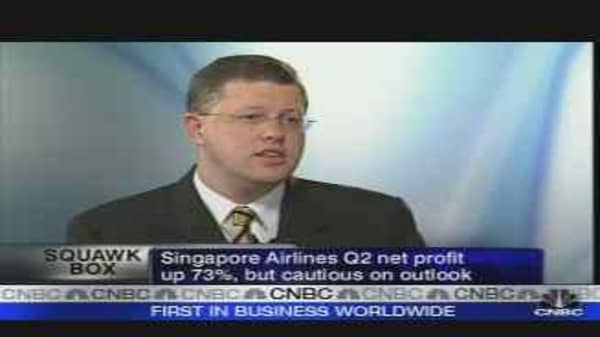The carrier reported second-quarter net profit of S$508 million (US$350 million), up from S$293 million from a year ago.
It carried 9.4 million passengers in the first half of its financial year, pushing its operating profit up 82 percent from a year ago, to S$982 million for the April-September period.
Singapore Airlines raised its fuel surcharges last week by 6-9 percent, citing jet fuel prices that rose 43 percent this year to a record $104.40 a barrel on Tuesday. Jet fuel is the airline's single largest expense, contributing over 30 percent of expenditure.
Chew said Singapore Airlines has as of October hedged 47 percent of its jet fuel needs, and at an average price of $88 per barrel. "But we're not out of the woods yet as far as fuel prices are concerned," Chew said, citing the continuing rise in crude oil prices.
Singapore Airlines started commercial flights of the double-decker Airbus A380, the world's biggest jumbo jet, last week with a Singapore-Sydney service.
But it may face competition between Singapore and Kuala Lumpur, monopolized currently by Malaysian Airline System and Singapore Airlines, after the countries said last week they aimed to liberalize the route.
MAS said on Wednesday the government decision to open the lucrative route to competition ahead of time will hurt earnings.
But Chew said the impact of opening up the route on Singapore Airline's performance "is not material". "The route represents much less than 5 percent of our total profits, so even if we open up the route to other carriers, the dent will be very small," he said.
Singapore Air and parent Temasek had also agreed in September to buy a 24 percent stake in China Eastern Airlines for $918 million to gain access to China's fast-growing and lucrative air network.
"This is a strategic partnership where we will be able to participate actively on the board and management level of China Eastern," Chew said. He said Singapore Airlines will have two seats on the China Eastern's board of directors, and 12 of its senior management staff will take up key positions.
The two airlines will also codeshare on all Singapore and Shanghai services, Chew said.
Shares in Singapore Airline -- valued at S$17 billion and ranked only behind Air China's $28.6 billion -- are up nearly 12 percent this year, but lag the broader Singapore market's 26 percent rise and gains of 18 percent by regional rivals Cathay Pacific Airways and Qantas.



